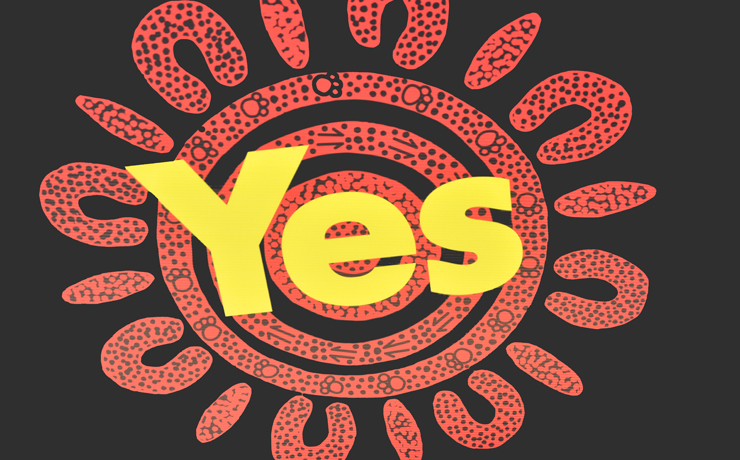
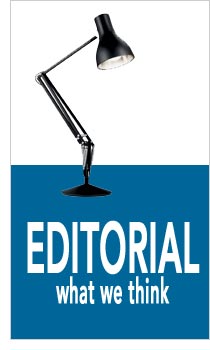
October 3, 2023
by Anne Miller
Early voting opens in Queensland today on what I believe is the most important decision Australians have been asked to make in almost half a century … giving a Voice to Indigenous Australians.
What you will be voting on:
A proposed law: To alter the Constitution to recognise the First Peoples of Australia by establishing an Aboriginal and Torres Strait Islander Voice. Do you approve this proposed alteration?
The debate over the past couple of months has been rancorous, divisive, angry and filled with social media-driven misconceptions or conspiracies.
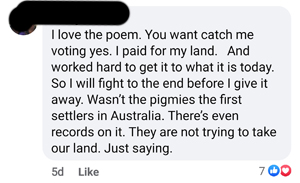
(Yes, Indigenous people have been in Australia longer than 10,000 years and no, Facebook “experts”, (see right), pygmies weren’t here before them!)
Sadly, the public debate has also been driven by simple, old-fashioned racism or by equally cold-blooded economic self-interest.
So what is “the Voice”?
If you answered “an advisory committee”, you’re correct.
It would have no power in its own right.

It cannot pass legislation, it cannot change legislation, it cannot dismiss the Parliament, it cannot make non-Indigenous Australians pay “reparations”, it won’t “take” your land, or any of the other ludicrous assertions that have been shared on South Burnett town pages (see right).
So why the push to have this basically toothless advisory committee – which will have moral authority, but little else – included in the Australian Constitution?
The answer is politics.
Every other Indigenous advisory committee that has been set up over the past century has at some point either been dismissed or emasculated, usually because of a change in government.
ATSIC, for example, was a democratically elected body but it is only remembered negatively in the non-Indigenous community because of the political rhetoric that gained traction ahead of its dismantling.
In fact, ATSIC and the “mistakes of the past” have been cited by National Party Leader David Littleproud during the current debate as a reason why a Voice should not be established.
Those of us who can remember back that far will recall cases of corruption and mismanagement in some ATSIC programs that were highlighted by the media and conservative MPs at the time.
But we don’t dismantle a police force when we uncover corruption, do we? We remove and punish the perpetrators and then we initiate reforms.
That wasn’t the case with ATSIC (1990-2005), it was simply axed despite the fact many of its programs were kicking goals, especially in housing and employment.
Some of the organisations that Indigenous communities take for granted today – including legal, health and media groups – can trace their roots back to ATSIC programs (for more information about ATSIC, read this Senate Committee report).
The difference between the Voice and ATSIC is stark.
ATSIC could allocate funding and run programs, even if only in a restricted way … the Voice would not. It would simply provide advice.
But the Voice would have one advantage. It would be stable. It could float above politics. It would not risk being axed on a whim by a change in the political colour of the Federal Government.
However, it would not be “permanent”, as some critics have claimed. If for some unforeseen reason problems became apparent, another referendum could be held …
There is a case for a “No” vote. But we believe it really only applies to Indigenous voters.
If you are Indigenous, you could possibly argue another toothless advisory committee with no real power is just a sop to colonial conscience and will achieve little beyond making some white people feel better.
If you are Indigenous, you could also argue that as sovereignty was never ceded, you don’t want anything to do with the colonising government’s imposed legal structures and Constitution.
Or like prominent “No” campaigner Warren Mundine has stated (former chair of another axed advisory committee, the Prime Minister’s Indigenous Advisory Council, 2013-19), you could believe that a “No” vote could make a Treaty more likely.
While we understand these positions, we don’t believe they are pragmatic, especially considering the demographic make-up of modern Australia.
Critics of the Voice have made much about these publicised divisions in Indigenous commentary. But why should we expect any group of people – Indigenous or not – to all think or act the same way?
There is no doubt that Indigenous Australians have been failed by governments in multiple ways since 1788.
There is also no doubt the disadvantages seen in many First Nations towns and families today can be linked to multi-generational dysfunction nurtured by shifting government policies over the decades, ranging from paternalism and neglect to naked racism.
We have seen grassroots programs that have sprung up within communities achieve some success, only to wither because of funding failures or policy changes.
The fact that many Indigenous Australians have achieved so much in the face of these hardships is a testament to their individual strength, resilience, resistance and persistence.
Will a Voice create an Australia divided by race? The fact is, Australia is already divided … just check out the “Closing The Gap” statistics (only four of the 18 targets are on track).
I believe the Voice could point to better ways to achieve a “levelling up”.
We MUST do better.
The Voice is a small start.
That’s why I will be voting “Yes”.
(And if you don’t know what it’s all about … find out! See some links below)
External links:
- The Voice – Resources
- Uluru Statement From The Heart
- Australian Electoral Commission Disinformation Register (countering disinformation about the actual voting process)
- Debunking Myths On The Voice To Parliament (Monash University 4.5Mb PDF)
- The official Yes / No Referendum pamphlet distributed to all households by the AEC (neither case fact-checked by the AEC) (257kb PDF)
- Amnesty International
- St Vincent de Paul Society
- Anglican Church of Australia
- The Salvation Army
- Is The Voice Too Uncertain or Risky? (Australian Public Law)
In the media:










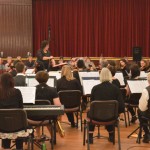

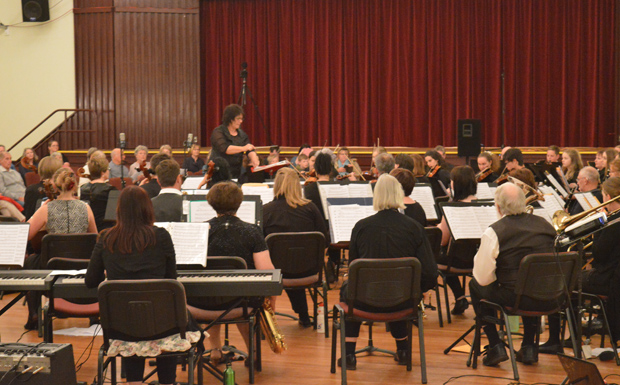
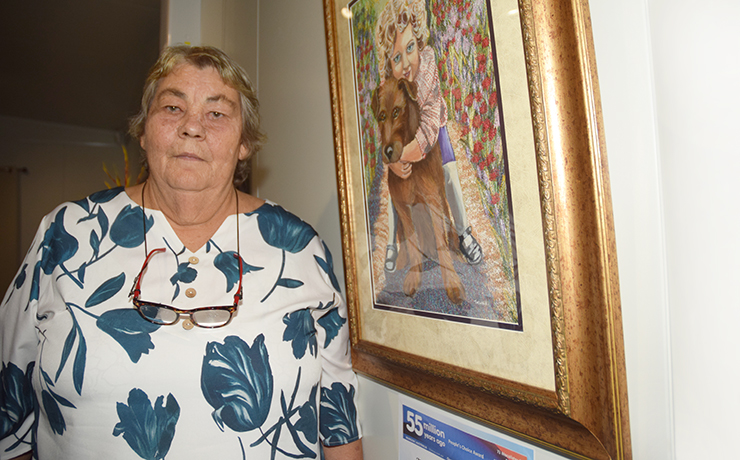










Thank you, Anne, for your informative article. I, too, believe that Indigenous people have a valid argument for voting NO. Why should they believe that this step will lead to ‘treaty’? Something that they have been denied since our ancestors arrived.
Can they trust us to overcome the fear that keeps us from granting equality? I hope they can and vote YES.
I am a no voter. Don’t care who knows. Trust any pollie, just say yes! Details later.
We have three senators (Burnie, Price and Thorpe) with very different points of view. What will make The Voice any different?
The voice of reconciliation, a real statement from the heart, was unveiled at Easter – the Forgiveness Cross on Memory Mountain.
Don’t know? Vote no.
Don’t know? Find out!
As far as I see, the Voice is basically an advisory committee. Why on earth didn’t the govt just quietly form a board, like they do with so many other things?
That’s all they had to do, choose people to be on it and then put it into motion. Then there would not have been a big hooha, and it would be operating right now. Instead they go for the worst avenue, a referendum, something that always polarises people.
It’s not the actual Voice, it’s the fact that people are suddenly alert to something, and fear takes over, and the endless arguements start because they MUST choose a side.
The same happened when the Gay rights referendum was held. Why on earth they didn’t just quietly give the people their rights, I don’t know.
Once you raise any topic, it will get heated as Yes clashes with No and neither will give way. This just divides us, no matter what the topic.
Better to just initiate the event and put it in place. That way most people won’t give a toss once it’s up and running.
The biggest worry is reverse psychology… the more you push people (especially with the very nasty name calling such as Yes people calling No people stupid and racist, for example, which happened to me, and from a good friend, too) the more you turn them against you and defeat your own cause.
Over and over, I have seen “waverers” turning to No, because they are just sick of it all and want it to end.
After all, most of us are struggling with the “cost of living” crisis and buying next week’s groceries is more of a worry than an Advisory Board.
PS. Dad waited years for an apology from a “government” who rolled into his country and took his family farm. No apology, no compensation. Nothing… just five years in Flossenbürg, now THAT’S being hard done by.
The only reason the Voice is being put to a referendum is to protect it from the whims of politicians – if it’s in the Constitution it can’t be axed the way ATSIC was when John Howard took a dislike to it.
And if the Voice turns out to be a bad idea (although I can’t see why an advisory committee would be) another referendum could remove it, so the risk of voting YES is pretty minimal.
However, if the No vote wins, Australia is going to look like a pariah to the international community and reconciliation efforts will be set back decades.
This would be a tragic outcome that we’ll all have to live with, however we choose to vote.
Good heavens, Maree, this concerns our Nation’s Constitution. Your flippant reasons for acting on this are disturbing.
It’s not a matter of ‘oh give them what they want quietly, so there’s no kerfuffle’ as you would when you slip the kids some extra lollies behind Dad’s back. It’s a solemn matter, it has to do with respecting the rights of others, especially those who have been treated as a minority group in our history.
A few years back, it was time to stand up and say loud & clear that we agree all people have the right to marry. It was an important day for all Australians when that was passed; it showed that overall, we are NOT a Nation of people living in the past.
It is now time to stand up and say loud and clear that First Nations people have the right to have their say in matters affecting them.
If people in today’s society cannot openly discuss & debate these matters without all the angst, without the notions of ‘let’s just do it quietly lest we upset anyone’ , without the name calling (and seriously, if all you were called was stupid and racist, I know a lot of First Nations people who would LOVE that this was as bad as the name calling got for them!) and without the fear of reprisal for speaking your true feelings, then this Nation is devolving instead of evolving.
We all came from diverse ancestors, we all survived to form this Nation; cherish it and ALL who live here. The events overseas in the last few days remind us what a truly Lucky Country we live in. Accept each other as fellow Australians so we can continue to live together in peace with maybe a bit more harmony.
To everyone I would say, STOP reading social media, just read the official pages explaining what is being proposed. From those words you will find all you need to know and surely can form your own opinion.
We have secret ballots in this country for a reason; so that you can voice YOUR opinion without any need to share your response with anyone. With that luxury, why would you want to enter a conversation trying to defend your stance? It’s no one’s business but your own.